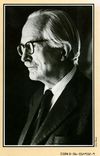The Empty House
The Empty House is a novel of suspence by the British author Michael Gilbert published in England by Hodder and Stoughton in 1978 and in the United States by Harper & Row in 1979. It was Gilbert's 19th novel. Like a number of other works by Gilbert and his near contemporaries Victor Canning and Ross Thomas, it is a political thriller about the amorality and sometimes lethal reactions of those in the highest government positions when confronted by seemingly trivial events that blossom uncontrollably into perceived challenges to their positions.
Plot
Written with Gilbert's usual urbane and understated style, the events mostly take place
Gilbert himself was a most Establishment figure, frequently writing about other Establishment figures, and was usually firmly on the side of England's police forces and shadowy (though lethal) Intelligent departments. But perhaps because of his many years of legal practice, he was also equally at home in filling his narratives with other types of characters: sleazy strip-club owners, tough and semi-crooked policemen, hard-bitten union officials, factory workers, relentless and unscrupulous Intelligent agents, and a wide variety of hard-boiled villains and crooks from small-time burglars and con men to gangster chieftains.
The Empty House begins with
There is, nevertheless, a sharp edge to the entire story that is entirely in keeping with what one of Gilbert's American editors said about him after his death in 2006, many years after the publication of Flash Point:
"He's not a hard-boiled writer in the classic sense, but there is a hard edge to him, a feeling within his work that not all of society is rational, that virtue is not always rewarded.".[1] Such is the case in Flash Point, although Jonas Killey himself, the uncompromising instigator of so much national drama, comes to a benign closing in totally different, non-legalist surroundings.
Reception
Newgate Callendar, . Nevertheless a strong, well‐written book.[2]
Notes
- ↑ Douglas Greene of Crippen & Landrau, quoted in The New York Times, 15 February 2006
- ↑ The New York Times, 19 January 1975 at https://timesmachine.nytimes.com/timesmachine/1975/01/19/76329705.html?pageNumber=251
